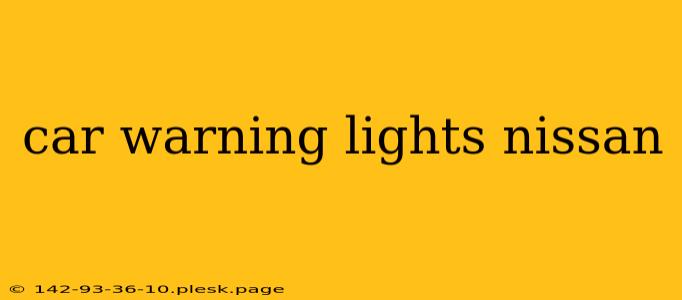Understanding your Nissan's warning lights is crucial for maintaining your vehicle's health and ensuring your safety on the road. This comprehensive guide will help you decipher those dashboard symbols, from the common to the more obscure. We'll break down what each light means, what to do when it illuminates, and when you should seek professional help from a Nissan mechanic.
Common Nissan Warning Lights and Their Meanings
Many warning lights are standardized across car manufacturers, but nuances exist. Let's explore some frequently encountered Nissan warning lights:
Engine Warning Light (Check Engine Light):
This is arguably the most common warning light and typically depicted as an engine outline. Don't ignore it! This light indicates a problem detected within your engine's control system. It could range from a minor issue like a loose gas cap to a more serious problem requiring immediate attention, such as a failing sensor or catalytic converter issue. While driving may still be possible in some instances, it's best to get your vehicle checked by a mechanic as soon as possible. Ignoring this light could lead to further damage and costly repairs.
Battery Warning Light:
This light, often shaped like a battery symbol, indicates a problem with your car's charging system. It could signify a failing alternator, a loose battery connection, or a depleted battery. If this light comes on, avoid using excessive electrical accessories and get your charging system inspected promptly. Driving with this light on for extended periods can leave you stranded with a dead battery.
Brake Warning Light:
A brake warning light, usually depicting a circle with an exclamation point inside, signifies an issue within your braking system. This could be low brake fluid, a malfunctioning brake system component, or a problem with your parking brake. Never ignore this light. Addressing brake issues immediately is essential for safe driving.
Oil Pressure Warning Light:
This light typically displays an oil can with a drop of oil beside it. It warns of low oil pressure in your engine. This is a critical warning. Low oil pressure can lead to severe engine damage if you continue driving. Pull over immediately, turn off the engine, and avoid starting it again until you've checked your oil level and identified the cause of the low pressure.
Temperature Warning Light:
This light often depicts a thermometer or a stylized engine with rising steam. It indicates your engine is overheating. Immediately pull over to a safe location, turn off the engine, and let it cool down before attempting to diagnose the problem. Overheating can cause significant engine damage.
Less Common but Important Nissan Warning Lights
Beyond the common warning lights, several others deserve your attention:
ABS Warning Light:
The Anti-lock Braking System (ABS) warning light usually shows the letters "ABS" or an ABS symbol. If this light is on, your ABS may not be functioning correctly. While you can still brake, the ABS functionality will be lost, potentially affecting your braking performance in slippery conditions.
Airbag Warning Light:
The airbag warning light typically displays an airbag symbol. If this light remains illuminated, it suggests a problem with your airbag system. This requires immediate professional attention to ensure your safety in the event of a collision.
Tire Pressure Monitoring System (TPMS) Warning Light:
This light alerts you to low tire pressure in one or more of your tires. Check your tire pressure using a gauge and inflate tires to the recommended pressure found in your owner's manual or on the tire sidewall.
When to Seek Professional Help
If you're unsure about the meaning of a warning light or if a light stays on despite taking corrective action, always consult a qualified Nissan mechanic. Attempting to diagnose and repair complex automotive issues without proper knowledge and tools can be risky and potentially lead to further damage.
This guide provides a helpful overview of Nissan warning lights, but it's not a substitute for your vehicle's owner's manual. Always refer to your manual for specific details and recommendations related to your Nissan model. Regular maintenance and promptly addressing warning lights will help prolong the life of your vehicle and ensure your safety on the road.

